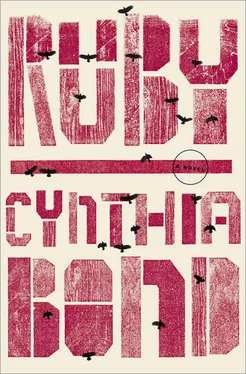“I was playing but now you done made me mad niggah!” He charged, but a rivulet of water from Ephram’s direction stole under his size 13 Oxfords and Chauncy, the most surefooted of men, slipped and fell, chest flat upon Ephram’s vomit. The men exploded in rolling blasts of laughter.
Even Chauncy got the mean knocked out of him and surrendered to disgust. “Shit, man!” he said upon rising. “Shit! I got to walk home and change.” To Percy he called out, “Tell Mama I’ll be back directly.” He headed down the small hill, to the road, and once out of sight, veered left, in the distinct direction of Bell land.
The rest of the men ran and sought refuge under the leaves of a barclay tree. Ephram stood his ground, getting soaked through to the bone, heaving and strong, all tingling washed away, a steady calm surging through his body.
Otha Jennings’s grave rested five headstones to the right and four up from where Ephram stood. A simple cement curved block with praying hands etched into the gray. Ephram tended it most Sundays after church, keeping the grass trim and flowers watered. The roots of buttercups and verbena wound atop the casket where Otha Jennings had been laid to rest. The coffin itself contained nothing of the woman, no bones, no teeth, not even a brush with a few strands of hair. Instead it contained her most dog-eared books, the Complete Works of Emily Dickinson and Call of the Wild by Jack London, a pair of her favorite gloves and her best lacing tat.
Ephram had been sixteen, Celia twenty-two when they had gotten the letter from Kindred Mental Hospital in Albuquerque, New Mexico, telling them of Otha’s death in the hospital fire in July of 1945. The Colored wing had burned down to its pilings, leaving nothing but white ash. After Ephram had sent a total of twelve letters requesting her records, some kind clerk had finally sent them. Full of words like “psychotic break/schizophrenia” and “delusional episodes.” A list of medications that neither Ephram nor Celia had ever heard of. When they showed it to Dr. Tully, the visiting Colored doctor from Beaumont, he’d never heard of half of them either. He’d closed Otha’s file, shaken his head and said a little curse and the words “lab rats” under his breath. When Celia had asked him what he meant, he’d just pressed his lips tight and said to be grateful she’d gone to her glory.
Otha Jennings had been born in Baltimore, in May of 1900, to an educated father and seamstress mother. She came from a long history of freedom. No great-grand nor grandmother, aunt nor uncle, had ever lived under the trace and toil of slavery. There was at the time, a very small yet substantial legacy of landed Negroes in America, Negroes who had achieved the unthinkable and had become doctors, lawyers, politicians, scientists, college presidents, businessmen. No one in Otha’s family had belonged to this group either. They were simple, striving people. Her father taught third grade at Washington Elementary, but before he died of consumption when Otha was fourteen, he’d already set aside enough money for her to continue her education at Fisk University in Tennessee. Otha was the only child of two only children. At seventeen she worked part-time with her mother after school and excelled in all things related to sewing, especially lace-making. Otha loved it so that she often dreamed in lace, delicate patterns covering her nighttime landscape. She was only a bit tall with skin as deep and rich as a plum. Her straight black “Indian” hair was from her mother’s side. It fell to her waist until she cut it, the summer before college, like Claudette Colbert. The hair on the floor had made the beautician cry. The next day she met the Reverend Jennings, a man twelve years her senior, on her way to church. She had just made a navy low-waisted shift dress for school and was feeling very grown up when he told her she looked like a new penny. She was shy until he told her he was a reverend visiting from Texas and that he was guest preaching at the Jesus First Name Holiness Church on Tinkle Street. He invited her to that evening’s revival. Since she was already on her way to a church choir meeting, Otha didn’t see the harm and walked with him to Tinkle Street. Otha, who had always attended a calm, quiet Episcopal church, had never heard a first class Holiness preacher when he got riled. He slung words around her like comets soaring. She was in awe and waited for him after service as he had requested, so he could walk the star struck teenager home. He asked her questions about her life, her mama, her deceased daddy, her neighborhood, her friends. He asked her about the university when she told him she was to be the first Colored woman she had ever known of to get a college education. She told him of her plans to be a nurse in a Colored hospital. He listened with great earnestness, eyes deep and wide, nodding in tune to her yielding voice. He took her home and mentioned that he would be in town three more days until Friday, so she’d invited him to dinner the next night without asking her mother.
Marilyn Daniels disliked the man, but she was raised well and so she welcomed him into her husbandless home. She could see the loosely plastered desperation that hung over the frame of the man, the manners tacked on like pictures to hide the cracks. Worst he was a fly-by-night preacher, a man without a home except the one he wore on his back. And that, noticed the seamstress, was of shoddy cloth and make.
When he left for the evening, with a promise extracted from them to attend the revival the following evening, Marilyn could almost feel him marking her door like a male dog — done all the more easily because her husband’s scent of tobacco and bay rum aftershave had long since faded.
Otha Daniels fell in love that next evening sitting in the third pew. Otha and her parents had always kept a quiet house. Reverend Jennings was a trumpet blasting into the tender space under her ribs. She could not understand why he was only the warm-up act for other, less worthy men. She was vexed by this, but knew that the injustice could be rectified — with her help. In that moment she ripped out the seams of her own dreams and patched them into his.
Her mother brought up ridiculous things like age and money. But when she mentioned Fisk and her daddy’s dream, Otha felt the wind leave her sails for a moment. She had been her father’s daughter and had believed and followed him in all things, but she was seventeen years old now, one month away from eighteen, and from everything she had learned of the world, everywhere she looked, women stopped being their father’s girls when they became a husband’s wife.
That next night the Reverend walked her home. There was not so much talking as they listened to their feet sweep along the sidewalk. They passed other Negro couples holding hands on the street and so he reached out and held her tapered, narrow hand in his. He began to talk about her hands, how long the fingers, how delicately they moved, how it had been one of the first things he had noticed about her. Otha had never thought of her hands as anything but agile tools to make lace and stitch. She felt a kind of magic running through her palms that made them want to dance like butterflies in the air.
They walked in circles, around parks, and dragged their feet long after the sun had fallen out of the sky. When they walked right by the graveyard where her daddy was buried, he’d kissed her so sweetly she melted into the earth. It was then that she had done it, given her daddy’s dream back to him. She had done it with tears of sorrow but also with joy, because this new dream was filling her solar plexus like blown glass, scalding hot and liquid at the same time. So they walked back to the church where Minister Bowing made them man and wife.
Читать дальше












